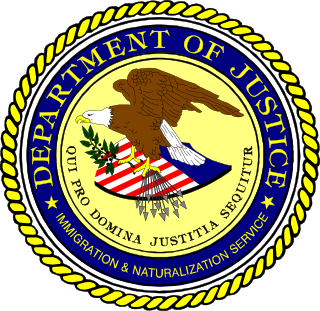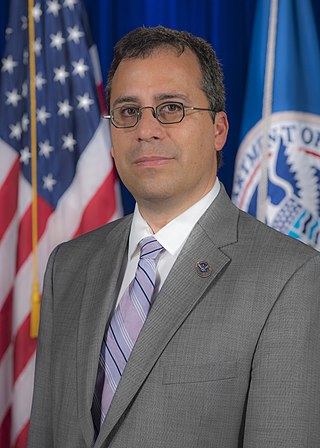Related Research Articles

The United States Department of Homeland Security (DHS) is the U.S. federal executive department responsible for public security, roughly comparable to the interior or home ministries of other countries. Its stated missions involve anti-terrorism, border security, immigration and customs, cyber security, and disaster prevention and management.

The United States Immigration and Naturalization Service (INS) was an agency of the U.S. Department of Labor from 1933 to 1940 and the U.S. Department of Justice from 1940 to 2003.

The United States Secretary of Homeland Security is the head of the United States Department of Homeland Security, the federal department tasked with ensuring public safety in the United States. The secretary is a member of the Cabinet of the United States. The position was created by the Homeland Security Act following the attacks of September 11, 2001.
U.S. Immigration and Customs Enforcement (ICE) is a federal law enforcement agency under the U.S. Department of Homeland Security. ICE's stated mission is to protect the United States from cross-border crime and illegal immigration that threaten national security and public safety.
U.S. Citizenship and Immigration Services (USCIS) is an agency of the United States Department of Homeland Security (DHS) that administers the country's naturalization and immigration system. It is a successor to the Immigration and Naturalization Service (INS), which was dissolved by the Homeland Security Act of 2002 and replaced by three components within the DHS: USCIS, Immigration and Customs Enforcement (ICE), and Customs and Border Protection (CBP).

An organizational ombudsman is a designated neutral or impartial dispute resolution practitioner whose major function is to provide independent, impartial, confidential and informal assistance to managers and employees, clients and/or other stakeholders of a corporation, university, non-governmental organization, governmental agency or other entity. As an independent and neutral employee, the organizational ombudsman ideally should have no other role or duties. This is in order to maintain independence and neutrality, and to prevent real or perceived conflicts of interest.
Parliamentary Ombudsman is the name of the principal ombudsman institutions in Finland, Iceland, Denmark, Norway, and Sweden. In each case, the terms refer both to the office of the parliamentary ombudsman and to an individual ombudsman.
The Pensions Ombudsman is the official ombudsman institution responsible for investigating complaints regarding pensions in the United Kingdom. The Pensions Ombudsman is a non-departmental public body stewarded by the Department of Work and Pensions, and the Ombudsman and Deputy Ombudsman are appointed by the Secretary of State for Work and Pensions. The Ombudsman is an independent commissioner; he and his staff are not civil servants. His brief is to resolve disputes of fact or law and to investigate claims of maladministration. Unusually for UK Ombudsmen, the Pensions Ombudsman's determinations are binding on the parties and enforceable in the County Court. There is a right of appeal to the High Court on a point of law. In England the High Court's permission has to be obtained for an appeal.

Kenneth Thomas Cuccinelli II is an American lawyer and politician who served as the senior official performing the duties of the Deputy Secretary of Homeland Security from 2019 to 2021. A member of the Republican Party, he also served as the Principal Deputy and Senior Official Performing the Duties of the Director of U.S. Citizenship and Immigration Services (USCIS) and was Attorney General of Virginia from 2010 to 2014.

E-Verify is a United States Department of Homeland Security (DHS) website that allows businesses to determine the eligibility of their employees, both U.S. and foreign citizens, to work in the United States. The site was originally established in 1996 as the Basic Pilot Program to prevent companies from hiring people who had violated immigration laws and entered the United States illegally. In August 2007, the DHS started requiring all federal contractors and vendors to use E-Verify. The Internet-based program is free and maintained by the United States government. While federal law does not mandate use of E-Verify for non-federal employees, some states have mandated use of E-Verify or similar programs, while others have discouraged the program.
The FBI Name Check is a background check procedure performed by the Federal Bureau of Investigation for federal agencies, components within the legislative, judicial, and executive branches of the federal government; foreign police and intelligence agencies; and state and local law enforcement agencies within the criminal justice system. The FBI Name Check is performed by the FBI as a part of the National Name Check Program, which dates back to Executive Order 10450 that was issued during the Eisenhower Administration. The FBI Name Check for an individual involves a search of the FBI's Central Records System Universal Index for any appearance of the name of the individual, as well as close phonetic variants and permutations of that name, in any of the records stored in the Universal Index. If any such occurrences are found, the Name Check also involves retrieval and analysis of the relevant paper and electronic files from local FBI offices and from other law-enforcement agencies.
Ombudsmen in Australia are independent agencies who assist when a dispute arises between individuals and industry bodies or government agencies. Government ombudsman services are free to the public, like many other ombudsman and dispute resolution services, and are a means of resolving disputes outside of the court systems. Australia has an ombudsman assigned for each state; as well as an ombudsman for the Commonwealth of Australia. As laws differ between states just one process, or policy, cannot be used across the Commonwealth. All government bodies are within the jurisdiction of the ombudsman.
The Office of Immigration Statistics (OIS) is an agency of the United States Department of Homeland Security under the Office of Strategy, Policy, and Plans.

An ombudsman, ombud, ombuds, bud, ombudswoman, ombudsperson or public advocate is a government employee who investigates and tries to resolve complaints, usually through recommendations or mediation. They are usually appointed by the government or by parliament.
A children's ombudsman, children's commissioner, youth commissioner, child advocate, children's commission, youth ombudsman or equivalent body is a public authority in various countries charged with the protection and promotion of the rights of children and young people, either in society at large, or in specific categories such as children in contact with the care system. The agencies usually have a substantial degree of independence from the executive, the term is often used differently from the original meaning of ombudsman, it is often an umbrella term, often used as a translation convention or national human rights institutions, dealing with individual complaints, intervening with other public authorities, conducting research, and – where their mandate permits them to engage in advocacy – generally promoting children's rights in public policy, law and practice. The first children's commissioner was established in Norway in 1981. The creation of such institutions has been promoted by the United Nations Committee on the Rights of the Child, and, from 1990 onwards, by the Council of Europe.

Systematic Alien Verification for Entitlements (SAVE) is a program managed by United States Citizenship and Immigration Services (USCIS), a branch of the U.S. Department of Homeland Security (DHS). SAVE facilitates lookups on the immigration and nationality status of individuals in the United States. It is an intergovernmental initiative designed to help federal, state, tribal, and local government agencies, or by a contractor acting on the agency's behalf, to determine eligibility for benefits, licenses or grants, government credentials, or to conduct background investigations. It is one of two programs that uses the Verification Information System (VIS). The other program is the Electronic Employment Eligibility Verification Program, also known as E-Verify, and is used by employers to verify the immigration status of employees. For additional verification, SAVE relies on the Person Centric Query System (PCQS).
The Priority Enforcement Program is a program by U.S. Immigration and Customs Enforcement (ICE), the agency responsible for immigration enforcement in the interior of the United States, under the U.S. Department of Homeland Security (DHS). PEP was an ICE program that worked with state and local law enforcement to identify illegal aliens who come in contact with state or local law enforcement, and remove those who are removable. PEP was announced by DHS Secretary Jeh Johnson in a November 20, 2014 memo as a replacement for Secure Communities (S-COMM). It builds on an updated list of immigration enforcement priorities released in another memo by Johnson issued on the same day.

Lee Francis Cissna is an American lawyer and government official who served as Director of United States Citizenship and Immigration Services from 2017 to 2019. Prior to assuming that role, he was the Director of Immigration Policy in the Office of Policy of the U.S. Department of Homeland Security.
The Immigration Examinations Fee Account (IEFA) is an account in the Treasury of the United States into which all revenues collected from fees for immigration and naturalization are deposited, and that is used to fund the costs associated with providing the immigration and naturalization benefits. The account funds most of the operations of the United States Citizenship and Immigration Services (USCIS), the sub-agency of the U.S. Department of Homeland Security that is tasked with most of the associated work.
The Glades County Detention Center, at 1297 East State Road 78 in remote Moore Haven, Florida, United States, opened in 2007 with 440 beds. Operated by the Glades County Sheriff's Office, besides Glades County arrestees, 90% of its beds house Immigration and Customs Enforcement detainees, which were previously spread around many county jails. It is Glades County's largest employer. It has been the site of widespread abuses, and in 2022, 17 members of Congress asked that it be closed.
References
- ↑ Congressional Quarterly Weekly Report 35 (3 September 1977): 1855.
- ↑ Taxation - Report of the National Taxpayer Advocate Nina Olson, American Bar Association, February 27, 2008
- ↑ Pub. L. 104–168 (text) (PDF) , 110 Stat. 1452 , enacted July 30, 1996, §101(a)
- ↑ Department of Homeland Security, "Office of the Citizenship and Immigration Services Ombudsman".
- ↑ "Office of the Immigration Detention Ombudsman". Homeland Security. Retrieved 2022-05-30.
- ↑ "6 USC 205: Ombudsman for immigration detention". United States Code. Retrieved 2022-05-30.
- ↑ "Contacting the Ombudsman". Federal Student Aid. Archived from the original on Mar 23, 2015.
- ↑ "Office of the Ombudsman". Food and Drug Administration. Archived from the original on May 28, 2009.
- ↑ "Public Counsel (Ombudsman's Office)". Nebraska Legislature. Archived from the original on 2022-12-04.
- ↑ Kent M. Weeks, Ombudsmen Around the World: A Comparative Chart, 2d. ed. (Berkeley: University of California, Institute of Governmental Studies, 1978), p. 162.
- ↑ "State of Hawaii - Office of the Ombudsman". Ombudsman.hawaii.gov. Retrieved 2024-04-10.
- ↑ "Office of Ombudsman, Iowa". Archived from the original on 2023-03-23.
- ↑ "Arizona Ombudsman" . Retrieved 2024-04-10.
- ↑ "Alaska Ombudsman" . Retrieved 2024-04-10.
- ↑ RI DEM/Office of the Ombudsman Home Page
- ↑ "Leo UIA".
- ↑ King County Ombudsman, Washington State
- ↑ Kroman, David. "Coming soon for Seattle city workers facing harassment: an advocate". Crosscut. Retrieved 7 December 2018.
- ↑ Los Angeles Department of Ombudsman